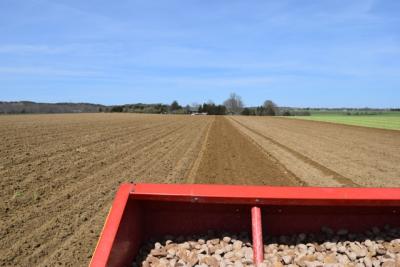Nature Notes: Spring As I Remember It

It’s 3 p.m. on Sunday and the sun is shining in full glory following three days of cloudy rainy weather. The robins and cardinals are singing their territorial songs, the trees are beginning to leaf out, the red maples are flowering, and the scarlet and black oaks are following in their stead. By the time this goes to press, the shads and beach plums will be in bloom, to be followed by the dogwoods, then the mountain laurels. It is spring as I remember it.
There is another part of spring’s coming that is just as precious to me, and I was reminded of it by reading Nancy and Benny Graboski’s late son’s poem, written when he was 16 in last week’s local weeklies.
It recalled the wonderful prelude to the annual spring plowing and the planting of the first potatoes on the Graboski farm in Bridgehampton. Potatoes were king on eastern Long Island for more than three-quarters of a century, long before Idaho got into the business.
Many people do not know that potatoes are one of the many vegetables grown here that are not started from seed. Instead, they are started by cutting up “seed” potatoes in March into three or four sections, each with an “eye” that is a pale green bud just starting out. On the North Fork the Polish women would sit in a small shed on improvised seats and with deft strokes of sharp knives carve the potatoes into viable sections for planting, all the time chatting and having a grand time, or so it seemed to me as I sat and watched and cut up a few potatoes myself.
They diced the potatoes as quickly and expertly as the oyster and scallop shuckers removed the shellfish meats, another seasonal rite practiced every fall when potatoes grown from the spring eyes are still being harvested. John Deere, Farmall, and Massey-Harris tractors would then be started up for the first time in the new year and the potato pieces would be put into the ground with a planter in tow. Up and down, back and forth, the tractors would put-put until in a few days thousands of acres of loamy soil would become seeded and ready to sprout.
While the farmers and their sons and helpers were planting those potatoes, another memorable rite of spring would be in progress. Trap fishermen would be setting their traps along the shores of the bays and harbors, haulseiners would be mending their quarter-mile-long beach seines, lobster and conch fishermen would be setting their pots. Commercial fishing and big farming went hand in hand. The rest of us took part as bystanders, whatever we were doing, wherever we were doing it, you could see it, smell it, hear it. The promise of spring was in full motion and our spirits were looking up.
From then on, every time you passed a freshly tilled field you would look for the first green sprouts. Every time you went by a waterway your nose would be sniffing for the scent of bunkers, eyes searching for dark moving patches of water.
You knew the very moment the fish arrived. The gulls would go crazy, the terns would be diving for killies and spearing, the ospreys for larger fish. All of a sudden the lands and waters that had lain dormant during those long winter months were buzzing with activity.
Those two rites of spring are still palpable today, but one has to look a little bit harder to find them. Some of the fields have been taken over by big houses, some of the waters by pleasure boats. Farmers and fishermen have walked the earth and plied the waters since Homo sapiens became bipedal and began paddling and rowing. They will be with us until the very end. It is a way of life that never grows old. One can make more money plying other trades, but there is no substitute for fresh, locally grown fruits and vegetables and fresh, locally caught fish and shellfish.
Big media, TV sitcoms, bad movies, yellow journalism, iPhones, tweets, Snapchats, robots, space exploration, rap music, and the rest of it will always be available and continue to take up much of our free time, but the oldest arts — fishing and farming among them — are still the best and will never betray us. Enjoy!
Larry Penny can be reached via email at [email protected].
